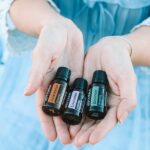Lavender essential oil is a highly versatile and popular oil that is widely used in aromatherapy. It is derived from the lavender plant, specifically the flowers, through a process of steam distillation. Lavender essential oil has a sweet, floral scent that is known for its calming and soothing properties.
The use of lavender dates back thousands of years, with evidence of its cultivation and use found in ancient civilizations such as the Egyptians, Greeks, and Romans. Lavender was highly regarded for its fragrance and was often used in perfumes, cosmetics, and bathing rituals.
Aromatherapy is the practice of using essential oils to promote physical and psychological well-being. It is a holistic approach to healing that harnesses the power of plant extracts to enhance health and wellness. Essential oils are highly concentrated extracts that contain the volatile compounds of plants, which give them their characteristic aroma and therapeutic properties.
The History of Lavender and Its Role in Traditional Medicine
Lavender has a long history of use in traditional medicine. In ancient times, lavender was used for a variety of purposes, including as a natural remedy for various ailments. The Egyptians used lavender in the embalming process and believed it had purifying and healing properties. The Greeks and Romans also valued lavender for its medicinal properties and used it to treat digestive issues, respiratory problems, and skin conditions.
In traditional medicine, lavender has been used to treat a wide range of conditions, including anxiety, insomnia, headaches, digestive disorders, and skin irritations. It was often used in the form of teas, tinctures, or poultices. Lavender was also believed to have antimicrobial properties and was used to disinfect wounds and prevent infection.
In modern medicine, lavender has gained recognition for its therapeutic properties. It is commonly used in aromatherapy to promote relaxation, reduce stress and anxiety, improve sleep quality, and relieve pain and inflammation. Lavender essential oil is also used in skincare products for its soothing and healing properties.
The Benefits of Using Lavender Essential Oil for Aromatherapy
Lavender essential oil is known for its wide range of therapeutic properties, making it a popular choice for aromatherapy. Some of the key benefits of using lavender essential oil in aromatherapy include:
1. Calming and Relaxing: Lavender essential oil has a calming effect on the nervous system, helping to reduce anxiety and promote relaxation. It can be used to create a peaceful and soothing environment, making it ideal for stress relief and relaxation.
2. Sleep Aid: Lavender essential oil is well-known for its ability to promote restful sleep. It has been shown to improve sleep quality and duration, making it a natural remedy for insomnia and other sleep disorders.
3. Pain Relief: Lavender essential oil has analgesic properties, meaning it can help to reduce pain and discomfort. It can be used topically to relieve muscle aches, headaches, and menstrual cramps.
4. Anti-inflammatory: Lavender essential oil has anti-inflammatory properties that can help to reduce inflammation and swelling. It can be used topically to soothe skin conditions such as eczema, psoriasis, and sunburns.
5. Skin Care: Lavender essential oil is beneficial for the skin and can help to soothe and heal various skin conditions. It has antimicrobial properties that can help to prevent infection and promote wound healing.
6. Respiratory Health: Lavender essential oil has respiratory benefits and can help to relieve congestion, coughs, and cold symptoms. It can be used in inhalation or steam therapy to promote clear breathing.
7. Immune Booster: Lavender essential oil has immune-boosting properties that can help to strengthen the immune system and fight off infections. It can be used to support overall wellness and prevent illness.
How to Use Lavender Essential Oil in Aromatherapy
There are several different methods of using lavender essential oil in aromatherapy, depending on the desired effect and personal preference. Some of the most common methods include:
1. Diffusion: One of the most popular ways to use lavender essential oil is through diffusion. This involves adding a few drops of lavender essential oil to a diffuser or humidifier, which disperses the oil into the air. This method allows you to enjoy the aroma and therapeutic benefits of lavender throughout a room or space.
2. Topical Application: Lavender essential oil can be applied directly to the skin, but it is important to dilute it with a carrier oil such as coconut oil or jojoba oil. This helps to prevent skin irritation and allows for better absorption. Lavender essential oil can be used in massage oils, lotions, creams, and bath products.
3. Inhalation: Inhalation is another effective way to use lavender essential oil. You can add a few drops of lavender essential oil to a bowl of hot water and inhale the steam, or you can use a personal inhaler or diffuser necklace to enjoy the aroma on the go.
When using lavender essential oil, it is important to follow dosage and dilution guidelines to ensure safety and effectiveness. The recommended dilution ratio for adults is typically 1-2% (5-10 drops of essential oil per ounce of carrier oil). For children and those with sensitive skin, a lower dilution ratio should be used.
It is also important to use lavender essential oil safely and effectively. Some tips for using lavender essential oil include:
– Perform a patch test before using lavender essential oil topically to check for any skin sensitivity or allergic reactions.
– Store lavender essential oil in a cool, dark place away from direct sunlight to preserve its potency.
– Keep lavender essential oil out of reach of children and pets to prevent accidental ingestion.
– If you are pregnant, nursing, or have any underlying health conditions, it is best to consult with a healthcare professional before using lavender essential oil.
Lavender Essential Oil for Relaxation and Stress Relief
One of the most well-known benefits of lavender essential oil is its ability to promote relaxation and reduce stress. Lavender has a calming effect on the nervous system, helping to soothe the mind and body. It can be used in aromatherapy to create a peaceful and tranquil environment, making it ideal for relaxation and stress relief.
Lavender essential oil has been shown to have anxiolytic (anti-anxiety) effects, helping to reduce feelings of anxiety and promote a sense of calm. It can help to lower blood pressure and heart rate, which are often elevated during times of stress. Lavender essential oil can also help to improve mood and promote a sense of well-being.
Inhaling the aroma of lavender essential oil can have an immediate calming effect on the mind and body. It can help to reduce feelings of tension, restlessness, and irritability. Diffusing lavender essential oil in the bedroom can create a relaxing atmosphere that promotes restful sleep.
Lavender essential oil can also be used topically for relaxation and stress relief. It can be added to massage oils or bath products to help relax tense muscles and promote a sense of calm. Applying lavender essential oil to the temples or pulse points can help to alleviate headaches and promote relaxation.
Lavender Essential Oil for Better Sleep and Insomnia
Another major benefit of lavender essential oil is its ability to improve sleep quality and duration. Lavender has long been used as a natural remedy for insomnia and other sleep disorders. It has a sedative effect on the nervous system, helping to promote relaxation and restful sleep.
Research has shown that inhaling the aroma of lavender essential oil before bedtime can help to improve sleep quality and duration. Lavender essential oil has been shown to increase slow-wave sleep, which is the deep, restorative sleep that is essential for overall health and well-being. It can also help to reduce nighttime awakenings and improve sleep efficiency.
In addition to its calming effects, lavender essential oil can also help to regulate the sleep-wake cycle. It has been shown to increase the production of melatonin, a hormone that regulates sleep and wakefulness. This can help to promote a healthy sleep pattern and improve overall sleep quality.
There are several ways to use lavender essential oil for better sleep. One of the most effective methods is to diffuse lavender essential oil in the bedroom before bedtime. This creates a relaxing and soothing environment that promotes restful sleep. You can also add a few drops of lavender essential oil to a warm bath or apply it topically to the temples or pulse points.
Lavender Essential Oil for Pain Relief and Inflammation
Lavender essential oil has analgesic and anti-inflammatory properties that make it an effective natural remedy for pain relief and inflammation. It can be used topically to alleviate muscle aches, joint pain, headaches, and menstrual cramps.
Lavender essential oil has been shown to have a numbing effect on pain receptors, helping to reduce pain and discomfort. It can be applied topically to the affected area using a carrier oil such as coconut oil or jojoba oil. Massaging lavender essential oil into the skin can help to increase blood flow and promote healing.
In addition to its analgesic properties, lavender essential oil also has anti-inflammatory effects. It can help to reduce inflammation and swelling associated with conditions such as arthritis, sprains, and strains. Lavender essential oil can be used in massage oils or creams for targeted pain relief.
Lavender Essential Oil for Skin Care and Healing
Lavender essential oil is beneficial for the skin and can help to soothe and heal various skin conditions. It has antimicrobial properties that can help to prevent infection and promote wound healing. Lavender essential oil is also known for its ability to calm and soothe irritated skin.
Lavender essential oil can be used topically to treat acne, eczema, psoriasis, and other skin conditions. It can help to reduce inflammation, redness, and itching associated with these conditions. Lavender essential oil can also help to balance sebum production, making it beneficial for oily or acne-prone skin.
In addition to its healing properties, lavender essential oil can also help to improve the overall appearance of the skin. It has antioxidant properties that can help to protect the skin from free radical damage and premature aging. Lavender essential oil can also help to promote a healthy and radiant complexion.
To use lavender essential oil for skincare, it is important to dilute it with a carrier oil such as coconut oil or jojoba oil. This helps to prevent skin irritation and allows for better absorption. Lavender essential oil can be added to facial cleansers, toners, serums, or moisturizers.
Lavender Essential Oil for Respiratory Health and Immunity
Lavender essential oil has several benefits for respiratory health and immunity. It can help to relieve congestion, coughs, and cold symptoms. Lavender essential oil has antimicrobial properties that can help to fight off infections and boost the immune system.
Inhaling the aroma of lavender essential oil can help to clear the respiratory system and promote clear breathing. It can help to relieve nasal congestion, sinus pressure, and coughs. Lavender essential oil can be added to a bowl of hot water for inhalation or used in a steam inhaler.
Lavender essential oil can also be used topically to relieve respiratory symptoms. It can be added to massage oils or chest rubs and applied to the chest and throat area. This can help to soothe coughs, reduce inflammation, and promote respiratory health.
In addition to its respiratory benefits, lavender essential oil can also help to boost the immune system. It has antimicrobial properties that can help to fight off infections and prevent illness. Lavender essential oil can be diffused in the home or workplace to help purify the air and prevent the spread of germs.
Precautions and Safety Measures When Using Lavender Essential Oil
While lavender essential oil is generally considered safe for most people, there are some precautions and safety measures to keep in mind when using it. It is important to use lavender essential oil responsibly and follow dosage and dilution guidelines.
Some potential side effects of using lavender essential oil include skin irritation, allergic reactions, and hormonal effects. It is recommended to perform a patch test before using lavender essential oil topically to check for any skin sensitivity or allergic reactions. If you experience any adverse reactions, discontinue use immediately.
Lavender essential oil should be used with caution during pregnancy, as it may have hormonal effects. It is best to consult with a healthcare professional before using lavender essential oil if you are pregnant or nursing. Lavender essential oil should also be used with caution in children, as their skin is more sensitive.
It is important to store lavender essential oil in a cool, dark place away from direct sunlight to preserve its potency. Keep lavender essential oil out of reach of children and pets to prevent accidental ingestion. If ingested, lavender essential oil can cause digestive upset and other adverse effects.
The Versatility of Lavender Essential Oil in Aromatherapy
In conclusion, lavender essential oil is a highly versatile and popular oil that is widely used in aromatherapy. It has a wide range of therapeutic properties and can be used to promote relaxation, reduce stress, improve sleep, relieve pain and inflammation, soothe and heal the skin, support respiratory health, and boost immunity.
Lavender essential oil has a long history of use in traditional medicine and has gained recognition in modern medicine for its healing properties. It can be used in various ways, including diffusion, topical application, and inhalation. It is important to use lavender essential oil safely and effectively, following dosage and dilution guidelines.
If you are looking for a natural remedy to promote health and well-being, lavender essential oil is definitely worth a try. Its calming and soothing properties make it an ideal choice for relaxation and stress relief. Whether you are looking to improve sleep quality, relieve pain, or support overall wellness, lavender essential oil can be a valuable addition to your aromatherapy routine.



